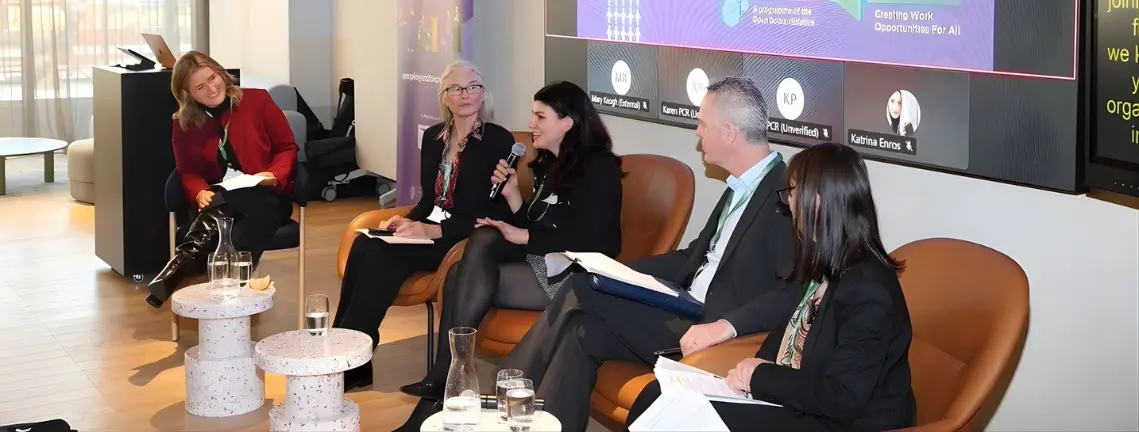What is Acoustic Privacy?


Acoustic privacy is quickly becoming one of the most important aspects of office design, especially as organisations embrace open-plan layouts and hybrid models. But what exactly is acoustic privacy, and why is it crucial for productivity and employee wellbeing, especially among neurodivergent individuals?
Acoustic privacy refers to the ability of a person to carry out a conversation or focus on work without being distracted by unwanted sound, or without their own conversations being overheard. In other words, it's the freedom from intrusive noise and the protection of auditory boundaries in a shared workspace. For employees across all industries, background noise from phones ringing, conversations, clicking keyboards or loud HVAC systems can seriously affect concentration, stress levels, and communication. However, for neurodivergent individuals, this noise can be not just distracting but overwhelming. Sound sensitivity is one of the most reported challenges among neurodivergent employees, often leading to fatigue, withdrawal, or decreased performance. This makes investing in proper office soundproofing solutions not just a matter of aesthetics or design, but of inclusivity and accessibility.

Why Offices Need to Prioritise Acoustic Privacy
With a growing awareness of neurodiversity in the workplace, companies recognise the need to accommodate different sensory profiles, learning styles, and communication needs. For neurodivergent employees, ambient noise isn’t just a mild nuisance; it can be a barrier to their full participation in the workplace. Many experience sensory overload, where competing auditory inputs can cause stress, anxiety, or even physical discomfort. This makes it difficult for them to focus, retain information, or engage in meaningful collaboration.
In contrast, an environment that offers quiet zones, acoustic pods, or noise-cancelling materials supports not only these individuals but also benefits everyone in the office. It boosts productivity, reduces sick days related to stress and burnout, and supports better mental health outcomes across the board. In fact, studies show that reducing noise in the office can increase task accuracy by up to 67%, with performance improving significantly in quieter environments.
From open-plan hubs to collaborative spaces and private meeting rooms, investing in soundproofing office products such as acoustic pods, sound-absorbing wall panels, and desk dividers can dramatically improve the functionality and inclusivity of a workspace. When designing for acoustic privacy, employers should involve their neurodivergent employees in the conversation to understand their unique needs. What may feel like a minor sound to one person could be incredibly disruptive to another. True acoustic comfort considers not only decibel levels, but also the type of sound, its duration, and the control employees have over their environment.
Practical Acoustic Privacy Solutions for Offices
Companies can implement acoustic privacy solutions in several practical ways to make workspaces more inclusive and focused.
- ACOUSTIC PODS
One of the most effective tools is the acoustic pod, a self-contained, soundproof booth that provides employees with a private space to make phone calls, host virtual meetings, or work in silence. Available in single-user or multi-person sizes, acoustic pods are particularly beneficial for neurodivergent employees who may need to escape noisy surroundings to reset or concentrate.
- SOUND-ABSORBING WALL PANELS
For more integrated design solutions, sound-absorbing wall panels offer excellent noise reduction while doubling as modern, aesthetic office elements. These panels are made from high-density foam or PET felt and come in various textures and colours, allowing organisations to customise them based on branding or department needs.
Another wise investment is white noise machines or sound masking systems, which help mask distracting sounds with consistent, low-level background noise.
- DESK DIVIDERS
Acoustic desk dividers are another excellent addition, especially in hot-desking environments where some level of separation helps define personal space. Rugs and upholstered furniture can also play a surprising role in sound absorption.
- QUIET ZONES
For organisations looking to implement flexible or hybrid models, it’s also worth creating designated quiet zones - areas specifically built to support deep focus or decompression. This is particularly important for employees with ADHD or sensory sensitivities, who may benefit from designated areas that signal, “This is a calm, low-stimulation space.”
Tips for Improving Acoustic Privacy in Your Office
Improving acoustic privacy doesn’t always require a complete office redesign. There are several straightforward, cost-effective strategies businesses can adopt today. Start by identifying noise hotspots. These are often communal areas like kitchens, printer stations, or corridors where sound tends to bounce and carry. Installing acoustic wall panels in these zones can help dampen the echo and reduce overall noise levels.
In open-plan offices, rearranging furniture to include softer, sound-absorbing materials, like couches, armchairs, and planters, can break up noise pathways and soften acoustics. Consider incorporating zoning strategies, where workspaces are divided into activity-based areas: collaboration zones, focus areas, and decompression corners.
Encouraging employees to use noise-cancelling headphones can also help, particularly for neurodivergent individuals who rely on auditory control to manage focus. Providing choice and flexibility is crucial. Empowering people to choose where and how they work - whether it’s in an acoustic booth for heads-down tasks or a collaborative zone for team brainstorming - respects individual needs and workstyles.

Include your employees in the conversation through anonymous surveys or feedback tools to identify common acoustic challenges. HR and Facilities Managers should also consider running training or awareness campaigns that promote noise etiquette in the workplace, such as keeping conversations to appropriate zones or using meeting rooms for calls.
Lastly, it’s important to design with scalability in mind. As your team grows or shifts, your acoustic solutions should be adaptable. Modular furniture and movable soundproof panels allow companies to reconfigure spaces easily without losing the benefits of acoustic protection. Every step toward acoustic comfort helps build a more inclusive, productive, and future-ready office.
Acoustic Privacy is Inclusion in Action
In an age where hybrid work, mental health, and diversity drive office innovation, acoustic privacy stands out as a fundamental yet often overlooked necessity. It affects how people work, how they communicate, and how they feel in a space. For neurodivergent individuals, it can mean the difference between thriving and surviving in the workplace. By investing in effective soundproofing solutions, like acoustic pods, wall panels, desk dividers, and quiet zones, companies demonstrate a commitment to building not just functional but also inclusive and human-centred workplaces. Whether you're looking to improve productivity, reduce stress, or create a neurodiverse-friendly environment, acoustic privacy is the foundation that supports it all.
---
At Codex, we believe that every employee deserves a workspace that supports their best work. That’s why we offer a curated range of office acoustic products, including acoustic office pods or phone booths, soundproof meeting pods, sound-absorbing wall panels, and privacy screens designed to meet the diverse needs of today’s offices.
Our team of office design experts would love to help you create a neuroinclusive office that champions inclusivity. From initial concept to installation, we offer a complete office fit-out service that includes space design and furniture allocation to office supplies. Open an account today or contact us at sales@codexltd.com if you require further information!
RELATED ARTICLES:






